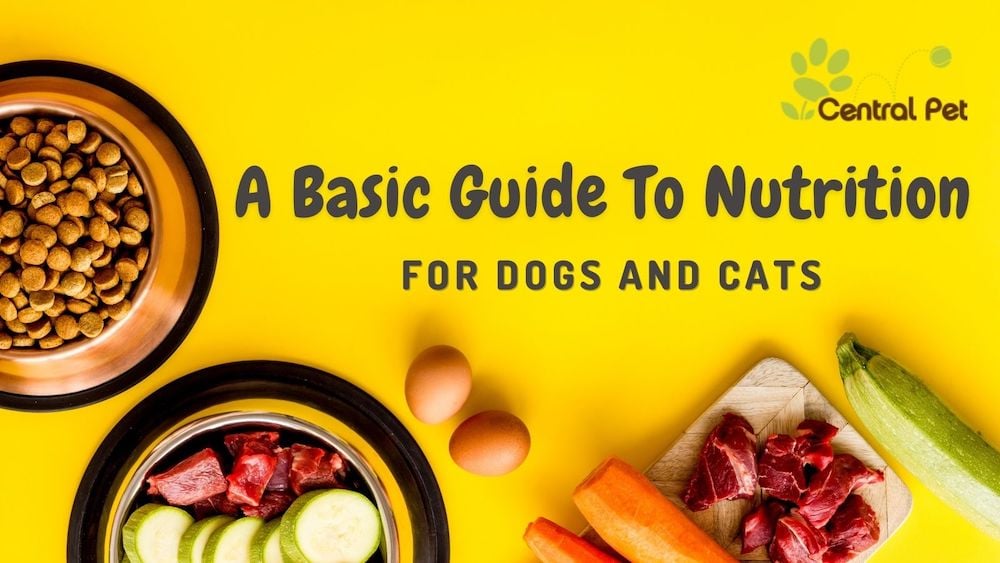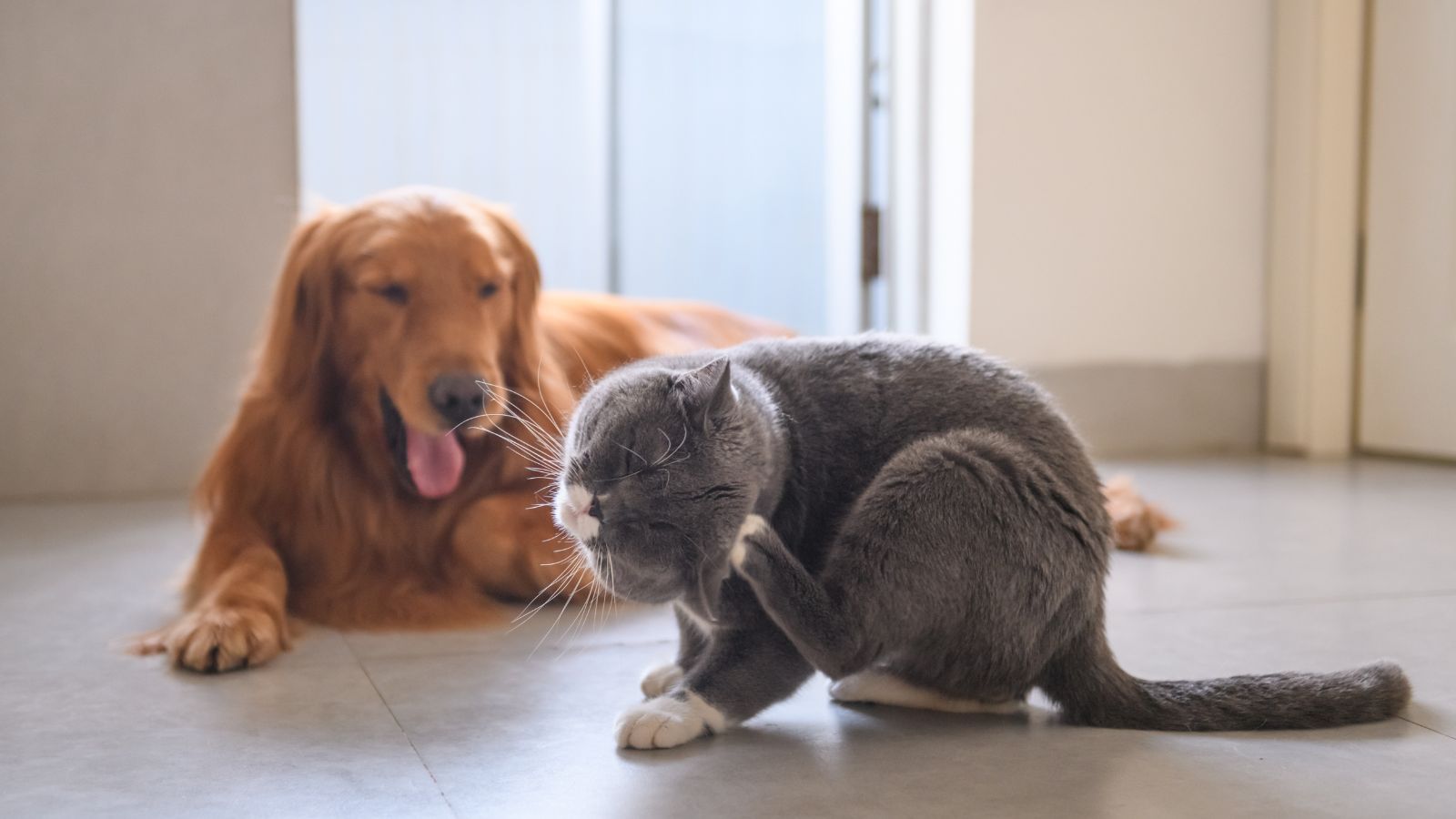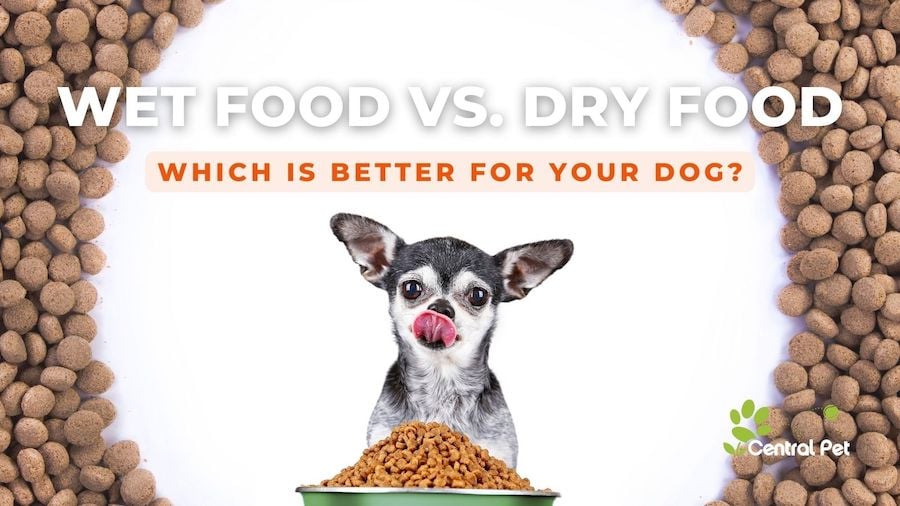Keeping our animals healthy is one of the best things we do to help care for our pets. One of the most significant yet overlooked ways of keeping your animal happy and healthy is through their nutrition. High-quality dog and cat foods help to give your animal the right blend of nutrients to maintain a well-rounded and balanced diet. However, it is important to regularly evaluate your pet’s food and behaviors to ensure that you continue to meet their needs throughout their lives.
What Are The Nutritional Requirements for Dogs and Cats?
The six essential nutrients are:
These nutrients are required as part of a dog or cat’s regular diet and are involved in all of the body's basic functions. It is important that your pet does not have too much or too little of these essential nutrients. While the minimum dietary requirement has been established for your pets in most nutrients, there is currently less known about the maximum levels for many nutrients, although some have been established. Additionally, consuming far too much of certain levels can be toxic for cats and dogs, and the toxicity results of these nutrients have been identified. What is less understood is what may happen over time with amounts of nutrients that are slightly too high or too low.
Good nutrition is essential to dogs throughout their lives, just as it is to humans. The nutritional requirements of dogs and cats vary depending on age, size, breed, and overall health. Young puppies and kittens require more calories than adults to grow properly. Older pets need more nutrients because their metabolism slows down with age.
Protein In Your Pet's Diet
Protein is an important nutrient for your dog and cat's diet. Protein can help maintain muscle mass and healthy tissue and provide amino acids for maintaining a healthy immune system. The most common protein sources in the pet food aisle are meat-based proteins such as beef and poultry, but there are also plant-based sources, including soybean meal, corn gluten meal, and wheat gluten meal.
The Role Of Carbohydrates In Pet Food
Carbohydrates, also known as carbs, are a critical part of any well-balanced diet. Pets should get at least 20% of their calories from carbohydrates. The benefits of carbs to pets include the ability of their bodies to turn sugars and proteins into energy and muscle. Additionally, carbohydrates improve the immune system response of dogs and cats. Carbohydrates can come from rice, potatoes, and vegetables like sweet potatoes or squash.
When selecting carbohydrates, you should look for options that are non-GMO and free of added sugar. The glycemic index is important to consider when selecting carbs as well. The glycemic index helps identify how much sugar is in certain foods. High glycemic index foods may have a lot of short-term energy but should be consumed more rarely. The most common example of a food with a high glycemic index would be white rice, while foods with a low GI include lentils or navy beans.
The Role Of Fats In Pet Food
Fats are an essential source of energy and have several benefits for pets. They are the building blocks of cell membranes, help absorb fat-soluble vitamins, and are an excellent source of energy. Fats also help your pet feel full, improve skin and fur quality, and reduce feelings of hunger between meals. Healthy fats include those found in:
- Fish oils
- Flaxseed oil
- Olive oil
- Avocado
- Nuts and seeds (Not all)
While some foods may seem healthy to humans, they can be dangerous to our pets. Please make sure you research foods like nuts before giving them any, as certain ones are safe while others can be dangerous.
Related Read: 10 Foods that are Toxic for Cats
Keep an eye on their food ingredients list to ensure they're getting enough healthy fats in their diet! Animal fats from beef, pork, lamb, or poultry provide plenty of calories for dogs and cats, but some animals may be sensitive to specific food sources. Salmon is another good choice because it is high in omega-3 fatty acids, essential for healthy skin and coat and immune system function.
The Importance of Vitamins and Minerals In Your Pet's Food
Vitamins and minerals are necessary for a well-balanced diet. They provide energy to the body, allow cells to function correctly, and help maintain healthy teeth, hair, skin, and gums. There are many benefits of vitamins and minerals in your pet's food. If you're unsure what vitamins and minerals your pet may need or how much they should take, talk with your vet or a nutritionist before feeding them any supplements. Common vitamins and minerals found within foods are:
- Vitamin A
- Vitamin D
- Vitamin E
- Vitamin K
- B-complex vitamins
- Calcium
- Phosphorus
Incorporating Water into Your Dog or Cat's Diet
Water is an essential ingredient in a well-balanced diet for your pet. Just like humans, our fur babies are made up mostly of water and should consume plenty of it throughout the day to prevent dehydration. Pet parents should make sure a water bowl is available at all times with fresh, clean water. If your pet refuses to drink water, try adding some tuna juice or beef broth to the bowl to make it tastier. In addition to giving your dog or cat fresh water, ensure you're providing them with other sources of hydration. Here are a few ways to switch up your pet’s water intake:
- Add water to their food
- Add some flavor to their water (by using chicken broth or tuna juice)
- Give your dog fruit
- Freeze it (Like humans, some dogs and cats enjoy ice. Use smaller cubes or shavings to avoid choking or damage to their teeth.)
- Offer a variety of bowls (Try using a different bowl to make your pet think it may be something other than water you’re putting in there)
Determining Your Pet's Dietary Needs
When determining the nutrients involved in any diet, it's important to remember that too much of something can be just as harmful as not enough of something. Therefore, the main way to ensure a complete and balanced diet is to give your pet the right balance of foods that suit their needs.
Vitamins and minerals are elements that are vital for our pets' health. A wide range of vitamins and minerals can be found in your pet's food. While pet food can meet your pet’s needs at some points in their lives, they may have imbalances that can be overcome with supplements of specific nutrients. It is important to work closely with your vet to ensure that your pet’s food is meeting its needs.
Related Read: Choosing the Right Vet
Typically, dog and cat foods will identify the standard ranges for animals, but if you notice behaviors in your pet that are changing, they may need additional nutritional support. Some examples of these behaviors include coprophagy (eating feces), excessive licking, or even changes in behavior. Your vet may recommend supplements if your pet is on a restricted diet or has other dietary needs.
How Much and How Often Should I Feed My Pet?
In general, kittens and puppies will eat more than adult versions. They're growing and tend to have faster metabolisms and use their energy for growing and playing. It's essential to avoid overfeeding your pet because it can make them sick or cause weight gain. Excess weight can have a negative impact on your pet’s health. Adult cats in optimal health only require two or three meals a day.
The precise ratio of nutrients can be unique to your pet's breed, age, lifestyle, sensitivities, or health concerns. If you're unsure about the nutrients your pet needs to support their health and well-being, speak to your veterinarian. A pet care professional can complete a diet history and any physical examinations necessary to determine the best nutritional profile for your cat or dog. The pet experts at Central Pet are also a good source of information for pet food with the highest quality ingredients.
Contact Central Pet for Dog Food Recommendations
If you are a pet parent in the Tucson, Arizona, area, you can talk to our knowledgeable staff at Central Pet about dog food and cat food recommendations. We know that high-quality dog and cat food is essential, and can help with any of your questions. Central Pet in Tucson conveniently offers several brands of pet food that meet our standards – and your pet’s! We have an incredible array of quality wet and dry food options for your animals.
Remember, your 11th bag is always FREE at Central Pet!





